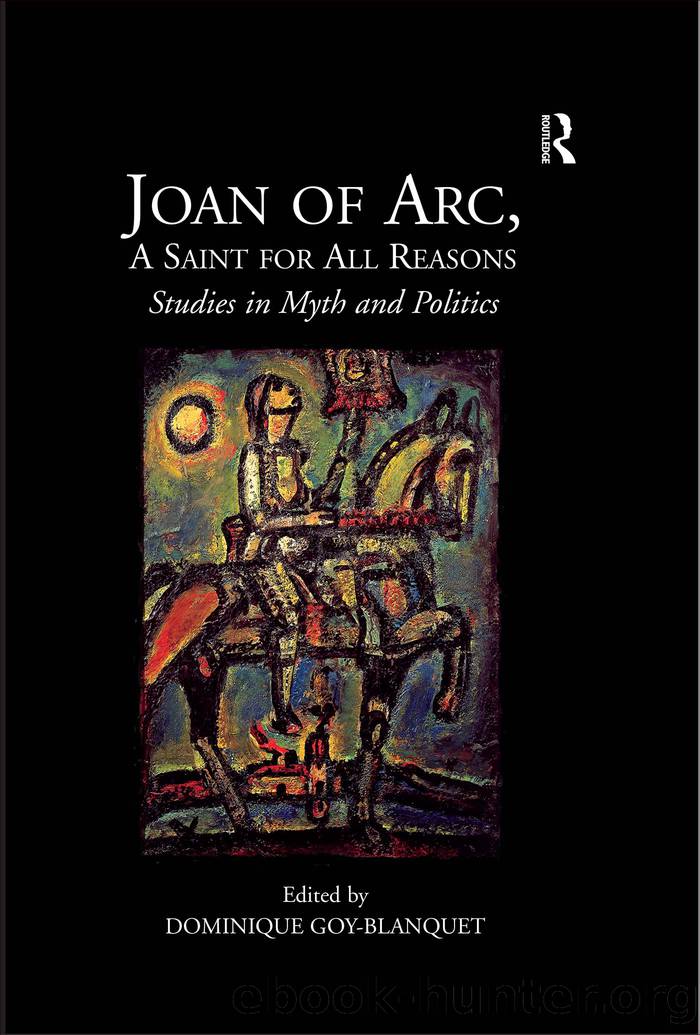Joan of Arc, a Saint for All Reasons by Goy-Blanquet Dominique;

Author:Goy-Blanquet, Dominique;
Language: eng
Format: epub
Publisher: Taylor & Francis Group
Published: 2016-08-15T00:00:00+00:00
Because she follows a higher goal than that of survival, Joan âundergoes a destiny rather than living a lifeâ.132 Bernanos poetically punctuates citations from the trial transcript and contemporary chronicles with his own summations, and thematic refrains like the repeated pronouncement: âNotre église est lâéglise des saintsâ (Our church is the church of the saints) â that is, the Church belongs to pure believers, not calculating functionaries. Bernanosâs highly personal contribution, much like Péguyâs, eventually became reduced and absorbed by right-wing propagandists into fanatical Catholic patriotism.
Speaking of calculating and clever, Jean-Jacques Brousson, that onetime secretary to Socialist Anatole France, as if to atone for his part in the latterâs sceptical biography of the Maid, in the years 1928 through 1940, wrote three books lauding Joan in reactionary yet cloyingly devout terms.133 Even in these we discern a sequel to his filial rebellion against the Master, from a philosophical angle. In the preface to one, Les Fioretti de Jeanne dâArc, a sort of Franciscan pastiche, he openly attacks the Vie de Jeanne dâArcâs intellectual rigour, likening it to one strolling through a âmedieval garden, armed with secateurs and a watering can full of vinegarâ. Brousson indirectly insults the Master when he dedicates the Fioretti to Pierre Champion, for his âprobityâ as an historian, recognizing him, not France, as the âprotectorâ of his âfirst steps in literatureâ. In reply, Champion deployed this probity to rebuke Brousson for maliciously misrepresenting the patriarch (Mon vieux quartier, 205-6). Broussonâs talents bloomed more fruitfully in scathing satire than in goodhearted praise.134 His volumes worshipping the Maid thus achieved less acclaim than his memoirs lampooning Anatole France, although the third volume on Joan did receive the papal imprimatur in 1939 â despite an inexcusable error (a ânon-secateurâ?) in dating her canonization as â1923â.
Brousson resurfaces on the eve of World War II, writing for the right-wing press. Ever the barbed-penned sycophant for the cause du jour, he extols Joanâs quintessential Frenchness in Je suis partout (I Am Everywhere), on 15 May 1937, to rebut the leftist outcry, similar to that discussed above, reappearing for that yearâs Joan festival: Obviously our countryâs saint is not in good odor with the Pasionariaâs [left-wing] fanatics. A virgin who believes in both God and country! Ah! Perhaps had there been a demonstration favouring that Judith who slipped into Holofernesâs tent and sweetly sliced off his head!â135 In the anti-Semitic climate that would soon harbour the Collaborationist government of Vichy, Judith is not recalled to validate Joan, as she was in medieval times, but as an anti-Joan, a (typically) deceitful, promiscuous Jew, like her Communist co-religionaries. For rightists like Brousson, Joan was the saint of an especially bigoted, xenophobic France: anti-Semitic, anti-Freemason, and Anglophobic â harking back to the anathematized triad of Cauchon-Dreyfus-Thalamas of 1904-1909.
The right found a more useful spokesperson in the long term than Brousson, the gifted polemical chameleon: Robert Brasillach (1909-45) was a profoundly brilliant apologist â an academically rigorous counterbalance to the lyrical, spiritual Bernanos. Born in southern France
Download
This site does not store any files on its server. We only index and link to content provided by other sites. Please contact the content providers to delete copyright contents if any and email us, we'll remove relevant links or contents immediately.
4 3 2 1: A Novel by Paul Auster(11788)
The handmaid's tale by Margaret Atwood(7447)
Giovanni's Room by James Baldwin(6808)
Asking the Right Questions: A Guide to Critical Thinking by M. Neil Browne & Stuart M. Keeley(5355)
Big Magic: Creative Living Beyond Fear by Elizabeth Gilbert(5351)
Ego Is the Enemy by Ryan Holiday(4956)
On Writing A Memoir of the Craft by Stephen King(4662)
The Body: A Guide for Occupants by Bill Bryson(4583)
Ken Follett - World without end by Ken Follett(4443)
Bluets by Maggie Nelson(4261)
Adulting by Kelly Williams Brown(4232)
Eat That Frog! by Brian Tracy(4149)
Guilty Pleasures by Laurell K Hamilton(4116)
White Noise - A Novel by Don DeLillo(3829)
The Poetry of Pablo Neruda by Pablo Neruda(3815)
Fingerprints of the Gods by Graham Hancock(3738)
Alive: The Story of the Andes Survivors by Piers Paul Read(3730)
The Book of Joy by Dalai Lama(3697)
The Bookshop by Penelope Fitzgerald(3619)
